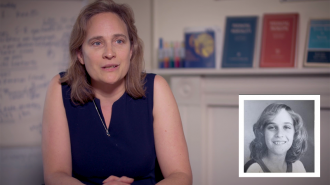
- Our studies
- Our research
- Publications and resources
- Data access and training
- About
- News
- Events
- Get in touch
- Join our mailing list

Welcome to our news and blogs section. Here you’ll find the latest developments and insights from across our longitudinal studies.
UCL and the University of Bristol are to lead the Population Research UK (PRUK) co-ordination hub, part of an existing strategic investment from the UKRI Infrastructure Fund.

The nine-item Malaise Inventory used in British cohort studies has been found to provide accurate and consistent measures of psychological distress both within and between generations, suggesting that participants’ understanding of mental health questions does not change over time.

Harmonised data from the 1946, 1958 and 1970 British birth cohorts on childhood environment and experiences are now available to the global research community via the UK Data Service.

This project uses multiple birth cohort studies to better understand socioeconomic inequalities in health, how these have changed across time, and how they may be reduced.
CLS associate professor Gabriella Conti has been named one of the winners of the 2019 Philip Leverhulme Prizes. The Philip Leverhulme Prizes recognise the achievement of outstanding researchers whose work has already attracted international recognition and whose future career is exceptionally promising.

Are boys more sensitive to the state of the local job market when choosing their GCSE subjects? And why are migrant and ethnic minority mothers at increased risk of mental ill health? Researchers have been using CLS study data to tackle these and other key questions.

Over the years, men who waited until their mid-20s to have their first child tended to report the best health in middle age, compared to those who started a family earlier. But, more recently, those who delayed fatherhood until their mid-30s appeared to be the healthiest in midlife.

Among the Baby Boomers and Generation X, people who had higher levels of emotional wellbeing during childhood and adolescence were more likely to report being satisfied with life when they reached adulthood.

Are boys more sensitive to the state of the local job market when choosing their GCSE subjects? And why are migrant and ethnic minority mothers at increased risk of mental ill health? Researchers have been using CLS study data to tackle these and other key questions.

CLS will present its latest research on survey methods at the European Survey Research Association (ESRA) conference this week (15-19 July 2019).
Congratulations to Professor Gabriella Conti, Co-Investigator of the National Child Development Study, on receiving the Nick Hales Award.

People who are obese from childhood through to middle age have more than double the risk of experiencing difficulties with everyday tasks at age 50 compared to those who were never obese.

With the 7-Up children returning to our TV screens this week at age 63 (4 June), Professor Alissa Goodman reflects on the importance of the show and the longitudinal studies she manages at CLS.
Ryan Bradshaw
Senior Communications Officer
Phone: 020 7612 6516
Email: r.bradshaw@ucl.ac.uk